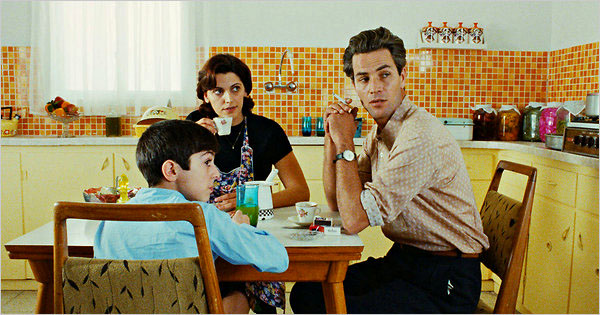|
Reviews of Recent Independent, Foreign, & Documentary Films in Theaters and DVD/Home Video

THE TIME THAT REMAINS The Time That Remains completes writer/director Elia Suleiman’s trilogy of semi-autobiographical films of one Palestinian family’s experiences from 1948 to the present. In Chronicle of a Disappearance (1996), Suleiman presented a comic and political diary of the absurdities and frustrations in the dead-end daily life for Arab Israelis in Nazareth and Jerusalem that, set before the first Intifada, now seems charmingly quaint. Divine Intervention (2002), subtitled “A Chronicle of Love and Pain,” mixed ironic reality with funny adolescent fantasies to counter powerlessness. The culmination, still starring Suleiman as a deadpan Keaton-esque observer, tackles more epic storytelling, with the maturity and sorrow to match his now gray hair. In this “Chronicle of a Present Absentee,” per the subtitle, E.S. (Suleiman) returns from living overseas, and a cab ride from the airport sets him on a road to revisiting several periods in his life. In 1948, Elia is a boy (Zuhair Abu Hanna) watching his father Fuad get swept up in the hasty resistance against the Haganah’s military onslaught after the establishment of Israel. (Adding another level of resonance, Fuad is stoically portrayed by the son of acclaimed actor Mohammed Bakri, Saleh Bakri, who continues a string of fine performances.) The population of their hometown of Nazareth is spared routing due to its Christian churches, whose carillon bells dominate the soundscape in all three films, though the bullying, round-ups, and executions of Palestinians are chillingly portrayed. A static and grim tableau of hooded captives manacled to trees is set against the pastoral landscape of the Galilee, seemingly intended to connect to the images of Abu Ghraib and Guantánamo prisoners. A few years later, this coercion still echoes when the boy has to awkwardly celebrate Israel Independence Day at school under patronizing administrators. (There’s also an amusing memory of the class watching Kubrick’s Spartacus with the teacher trying to explain away the romantic scenes.) The family’s story continues through the affectionate and chatty letters his mother (Samar Qudha Tanus) writes from her well-appointed kitchen to his older sister, who stayed in Jordan. They’re based on Suleiman’s mother’s actual correspondence. His father spends his days at his machine shop and his evenings fishing until the military becomes convinced he’s smuggling gun parts, and he’s again beaten. His later ill health is presumably linked to these incidents. The taxi time machine then jumps to 1980, when Elia, now a teenager (Ayman Espanioli), hangs around pals ogling Israeli women soldiers. This section mostly points to the genesis of scenes from the earlier films of guys passing time in cafés and at the Holy Land souvenir shop. In the two concluding, more personally touching, sections, E.S. comes home like an outsider, first to help his elderly father at a hospital during protests against the Israeli government’s property appropriation. (His second film also dealt with Suleiman coping with his father’s illness and death.) Then E.S. comes back to visit his nearly senile mother (now played by Shafika Bajjali). She’s being cared for by a talkative Asian, English-speaking home health aide, who has set up a Christmas tree in the living room. He also reunites with equally graying friends, who’ve retreated back into passivity. A
concluding ride to Ramallah feels a bit tacked on to poke fun at how
blasé one can become while living with looming Israeli guns and tanks on
the West Bank. But the more searing personal memories and fond domestic
scenes dominate most of the film—the family eating in the kitchen,
listening to music, watching TV, or passing time on the terrace (their view
becomes more and more built up over the years). These are
poignant reminders that besides the annual
Other Israel Film Festival and the literary work of
Sayed Kashua,
we rarely get to see or read so sympathetic a view about the
20 percent of Israel’s population that’s Arab.
Nora Lee Mandel
|

